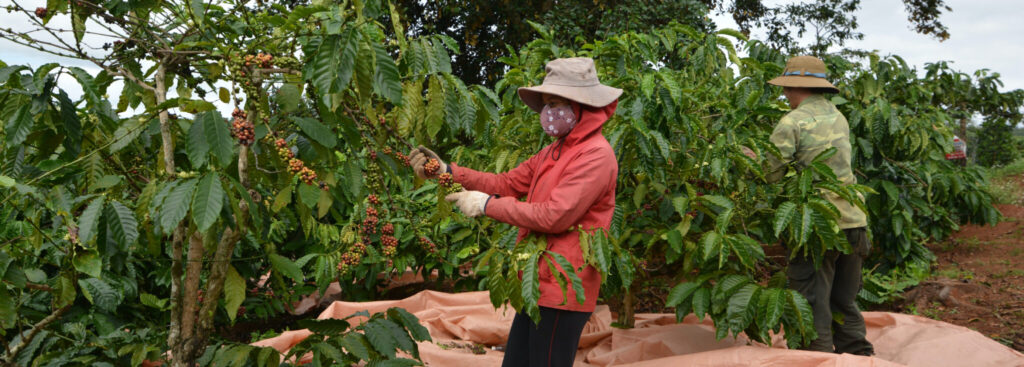Learn about OSH
Download the practical toolkit, access useful insights, and join technical activities
COFFEE TOOLKIT
Improving OSH in Coffee Supply Chains
This kit contains a compilation of tools, methodologies and research for reducing occupational accidents and diseases in the coffee supply chain.
You’ll find 20 tools, each developed and tested by the VZF, organized under three main themes: risk management, mitigation and prevention of COVID-19, and OSH knowledge. It may be used by any stakeholder working in the coffee supply chain, including governments, employers, workers, development partners, international organizations, and more.
The Importance of Safety and Health in the Coffee Supply Chain
Data Story: Worker Safety, Economic Significance, and the Vision Zero Fund

Useful insights
What are some of the safety and health issues faced by women producing coffee in Mexico?
Access the key findings of our research on the frequency of exposure of women coffee producers to OSH hazards.
What are the main occupational hazards and risks for coffee farmers and processors?
View a brief summary, as well as the drivers and constraints, for OSH improvement in the coffee supply chain.
How did the #CoffeePeople campaign create change for coffee workers?
View the key outcomes of the campaign, including actions taken to promote a safe and healthy working environment in the coffee supply chain.
TOGETHER FOR #COFFEEPEOPLE
Technical Activities
As part of the #CoffeePeople campaign, ILO and ITC Turin, with key sectoral stakeholders, are organizing the learning sessions below. Join these sessions to learn about the OSH challenges that coffee workers face in their jobs, and what methodologies and tools work to address them.
More information coming soon!
#CoffeePeople webinar 1:
“Challenges to guaranteeing Occupational Safety and Health in the Coffee Supply Chain”
The agricultural sector is one of the most hazardous sectors to work in. Each year, thousands of coffee workers around the world suffer work-related injuries and diseases. With the establishment and implementation of national OSH policies and adequate OSH management systems at workplace level combined with the right access to information and training these injuries and diseases are preventable. In this #CoffeePeople webinar, participants learned about the occupational safety and health challenges faced in the coffee supply chain and discussed what strategies work to promote and realize the right to a safe and healthy working environment in the coffee supply chain.
Speaker: Ana Catalina Ramirez, Occupational Safety and Health Specialist, International Labour Organization
#CoffeePeople webinar 2:
“Guidelines for implementing ILO’s “Work Improvement in Neighbourhood Development methodology. Practical approaches for improving safety, health and working conditions in agriculture.”
The ILO Work Improvement in Neighbourhood Development (WIND) training programme has given farmers all over the world momentum in improving their safety and health. The uniqueness of the WIND approach is that it enables the voluntary improvement of working and living conditions through the active participation of farmers, their families and the members of their communities. It focuses on simple and practical solutions that can be achieved using locally available, low-cost materials.
During this #CoffeePeople webinar, ILO VZF OSH specialists shared with participants key information to guide the implementation of the methodology, sharing common challenges, tips and tricks to ensure success.
Speakers: Jose Luis Barradas, OSH Technical Officer, ILO Mexico; Schneider Guataqui Cervera, OSH Technical Officer, ILO Bogota
#CoffeePeople webinar 3:
“Enhancing cooperatives’ capacity to promote occupational safety and health”.
#CoffeePeople webinar 4:
“Promoting decent work in the coffee supply chain: Good practices, opportunities, and challenges”.
Fundamental principles and rights at work, including a safe and healthy working environment, are the enabling conditions for decent work and sustainable economic growth. This webinar facilitated a dialogue among representatives from governments, employers’ and workers’ organizations in coffee-producing countries (Colombia, Uganda, Brazil) regarding the opportunities and challenges in progressing toward the realization of decent work for all coffee workers.
This event was organized by the ILO Vision Zero Fund and the “Supply Chains for a Sustainable Future of Work” project, with funding from the European Union.
Speakers: Erika Almario Alvarado, Secretary of Agriculture and Mining, Government of the Huila region, Colombia; Douglas Opio, Federation of Uganda Employers, Uganda; Laíssa Pollyana do Carmo, National Confederation of Rural Wage and Salary Workers – CONTAR, Brazil
Stay updated with the latest news and updates from the #CoffeePeople campaign
Discover the developments and initiatives driving positive change for coffee workers worldwide.
Get updates in your inbox
Get a curated collection of coffee supply chain content, including the latest news, human-centered stories, relevant events, and practical tips on how to get involved and share your journey.


